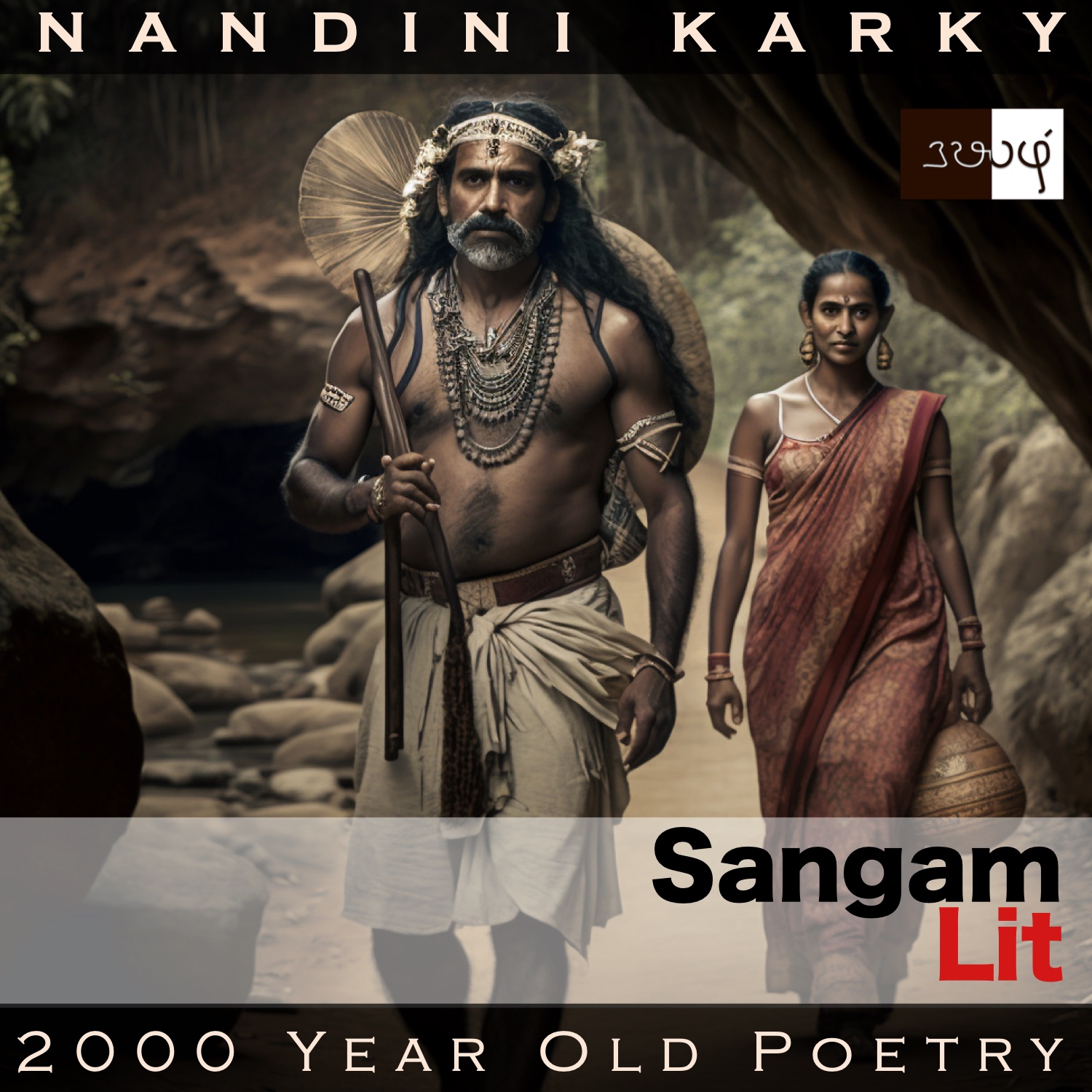Podcast: Play in new window | Download
Subscribe: Apple Podcasts | Spotify | Amazon Music | Android | iHeartRadio | TuneIn | RSS | More
In this episode, we perceive the regard that a poet has in his heart for this patron, as portrayed in Sangam Literary work, Puranaanooru 135, penned about the Velir King Aay Andiran by the poet Uraiyoor Enicheri Mudamosiyaar. Set in the category of ‘Paadaan Thinai’ or ‘King’s praise’, the verse describes the journey of this poet and the reason he has arrived at this king’s court.

கொடுவரி வழங்கும் கோடு உயர் நெடு வரை,
அரு விடர்ச் சிறு நெறி ஏறலின், வருந்தி,
தடவரல் கொண்ட தகை மெல் ஒதுக்கின்,
வளைக் கை விறலி என் பின்னள் ஆக,
பொன் வார்ந்தன்ன புரி அடங்கு நரம்பின்
வரி நவில் பனுவல் புலம் பெயர்ந்து இசைப்ப,
படுமலை நின்ற பயம் கெழு சீறியாழ்
ஒல்கல் உள்ளமொடு ஒரு புடைத் தழீஇ,
புகழ்சால் சிறப்பின் நின் நல் இசை உள்ளி,
வந்தனென் எந்தை! யானே: என்றும்,
மன்று படு பரிசிலர்க் காணின், கன்றொடு
கறை அடி யானை இரியல் போக்கும்
மலை கெழு நாடன்! மா வேள் ஆஅய்!
களிறும் அன்றே; மாவும் அன்றே;
ஒளிறு படைப் புரவிய தேரும் அன்றே;
பாணர், பாடுநர், பரிசிலர், ஆங்கு அவர்,
தமது எனத் தொடுக்குவராயின், ‘எமது’ எனப்
பற்றல் தேற்றாப் பயங் கெழு தாயமொடு,
அன்ன ஆக, நின் ஊழி; நின்னைக்
காண்டல் வேண்டிய அளவை வேண்டார்
உறு முரண் கடந்த ஆற்றல்
பொது மீக்கூற்றத்து நாடு கிழவோயே!
A long song from the heart about King Aay. The poet’s words can be translated as follows:
“In the mountain ranges with soaring peaks, where the striped tiger roams around, after climbing the inaccessible small path in the cleft, with tiredness, I walked slowly with the bangle-clad singer-dancer with a curving form.
As if gold was poured as thin streaks, appear the well-tied strings in this useful, small lute that accompany lyrics of many lines resounding all across the land, and on which I play the ‘padumalai’ tune. With a fatigued heart, embracing my instrument on one side, thinking of your much praised renowned fame, I came here, my lord!
Day after day, when you see supplicants in your court, you grant them elephants with thick legs, along with their calves too, O king of the mountains, the heir of a great dynasty Aay! I come here seeking not an elephant or a horse, or a glowing chariot.
When bards, singers, supplicants and many others claim something as theirs, you would never take it back from them by declaring, ‘It’s mine’. May your days remain so! I came here only because I wanted to see you, O warrior with the strength and ability to rout your enemies, O leader of a nation that is celebrated far and wide!”
Time to explore the details herein. The poet begins by narrating how he came to be where he was at the moment. He talks about what sounds like a dangerous domain in the mountains, where tigers are prowling around. Here, with much difficulty, he and his companion, a female singer-dancer, seem to have climbed a hard-to-reach cleft and found a narrow mountain path that led them there. This rendition is in a tone reminiscent of the manner in which the protagonist of ‘Aham’ poems comes to meet his lady love in the middle of the night.
Returning, we see how the poet after talking about the ‘where’, now turns to what he’s carrying in his hands. It’s a small lute, whose strings appear as if gold has been poured in thin lines. He details how this is the preferred accompaniment of lyrics in those times and how he in particular favours the ‘padumalai’ tune. After this account of the musical instrument, as if saying ‘Enough about me’, the poet turns to describe the king and his habit of giving not only elephants but their calves as well to people who came seeking to him in his court. With a ‘however’, the poet makes it clear that is however not his intention in coming there, declaring it’s not an elephant or a horse or chariot that he thought of, when he set out on this journey.
Instead of directly saying what is that he wants, the poet continues to talk about the king saying the ruler is not one to take away what supplicants claim as theirs, saying ‘No, no, I can’t give you that. That’s mine’. Such a thought would be unthinkable in the king’s mind and anyone just has to ask, for him to give away, the poet implies. Another record of the limitless generosity of this king. Finally, the poet concludes with the words that the reason he came before this famous king, known for his strength in the battlefield and for his praiseworthy country is only because he wanted to see the king!
‘I need no gifts, no gold, nothing from you, my lord. A sight of you is all I seek’, declares this ancient poet. His deep love and respect for this ruler is etched in this thought that rises high above the materialistic pursuits of getting something from someone and instead just wishing for their presence. I’m reminded of how when friends who come from overseas ask, ‘What do you want from here?’, and I answer, ‘Nothing at all. Just want to see you and spend time with you.’ A verse that makes me want to declare, ‘No gift can be more precious than the time and attention given by one human to another!’.




Share your thoughts...